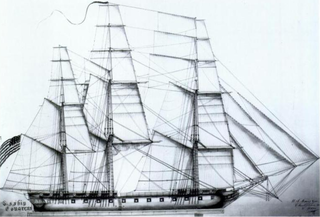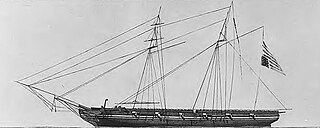USS Enterprise may refer to the following ships and other vessels:
USS Wasp may refer to the following ships of the Continental and United States navies:
Eight ships of the United States Navy and United States Revenue Cutter Service have been named USS Massachusetts, after the Commonwealth of Massachusetts.
The wildcats are small cats native to Europe, the western part of Asia, and Africa.
Several ships of the United States Navy have been named USS Hancock or USS John Hancock, in honor of patriot and statesman John Hancock.
Five ships of the United States Navy have been named Ariel, after the sprite Ariel in William Shakespeare's play The Tempest.
USS Eagle may refer to the following ships of the United States Navy:
A lynx is a type of wild cat.

The Mediterranean Squadron, also known as the Mediterranean Station, was part of the United States Navy in the 19th century that operated in the Mediterranean Sea. It was formed in response to the First and Second Barbary Wars. Between 1801 and 1818, the squadron was composed of a series of rotating squadrons. Later, squadrons were sent in the 1820s to the 1860s to suppress piracy, primarily in Greece and to engage in gunboat diplomacy. In 1865 the force was renamed the European Squadron.
Six ships in service to the United States have been named Revenge.
USS Wild Cat (1862) was a captured Confederate schooner acquired by the Union Navy from the prize court during the American Civil War. She was put into service by the Union Navy to patrol navigable waterways of the Confederacy to prevent the South from trading with other countries.

USS Polaris, originally called the America, was an 1864-screw steamer procured by the Union Navy as USS Periwinkle during the final months of the American Civil War. She served the Union Navy's struggle against the Confederate States as a gunboat.
USS Greyhound has been the name of more than one United States Navy ship, and may refer to:

The West Indies Squadron, or the West Indies Station, was a United States Navy squadron that operated in the West Indies in the early nineteenth century. It was formed due to the need to suppress piracy in the Caribbean Sea, the Antilles and the Gulf of Mexico region of the Atlantic Ocean. This unit later engaged in the Second Seminole War until being combined with the Home Squadron in 1842. From 1822 to 1826 the squadron was based out of Saint Thomas Island until the Pensacola Naval Yard was constructed.
USS Terrier has been the name of more than one United States Navy ship, and may refer to:

The West Indies Anti-Piracy Operations refer to the United States Navy presence in the Antilles, and surrounding waters, which fought against pirates. Between 1817 and 1825, the American West Indies Squadron constantly pursued pirates on sea and land, primarily around Cuba and Puerto Rico. After the capture of Roberto Cofresi in 1825, acts of piracy became rare and the operation was considered a success although limited occurrences went on until slightly after the start of the 20th-century.
USS Ferret was a two masted schooner, the third U.S. Navy vessel to bear this name, and was purchased 20 December 1822 at Baltimore, Maryland and commissioned early in 1823, with Lieutenant R. Henley in command. It was the first U.S. naval ship commanded by the famous naval hero David Farragut. Ferret served transporting U.S. sailors, marines and supplies to the pirate infested waters of the Caribbean and was used to search out and attack pirate ships and pirate strongholds for a little more than two years when her career was cut short when the vessel capsized in a gale force storm off the coast of Cuba.

USS Wildcat was a two masted schooner of 48 tons and was part of a U.S. naval fleet, and part of the West Indies Squadron, that sailed to the Caribbean to subdue the occurrence of pirate raids on merchant ships that had increased to almost 3,000 by the early 1820s. She was armed with three guns and had a crew of 31. Wildcat was commanded by Lieutenant Legare' who sailed her to Washington with a dispatch regarding the disposition of the squadron and other matters concerning the war against piracy in the Caribbean. On 28 October 1824 Wildcat was lost in a gale with all hands while sailing between Cuba and Thompson's Island, West Indies. Approximately 31 drowned.
This page is based on this
Wikipedia article Text is available under the
CC BY-SA 4.0 license; additional terms may apply.
Images, videos and audio are available under their respective licenses.




